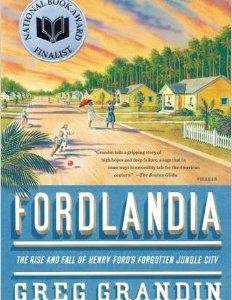Good day everyone, hope all is well! Welcome to my sixth book review, this time I will be reviewing a historical book called Fordlandia: The Rise and Fall of Henry Ford’s Forgotten Jungle City by Greg Grandin. A good size book of 372 pages. I will admit I cheated a little with this book because I read this book earlier in the year for grad school, but I still remember the content of the book as if I had to write an assignment.
Overview: It’s 1927, Henry Ford is one of the richest men in American dominating the auto industry. Ford now wants to try his hand with the rubber industry, so Ford buys land in the Brazilian Amazon twice the size of Delaware to achieve this industry. Ford’s ultimate goal is to have a thriving rubber plantation run by the locals who will have conformed to the American way and around the rubber plantation there will be a thriving city filled with American luxuries. But, immediately after Ford bought the land for the rubber plantation and city that was going to be Fordlandia there are problems: the untamable jungle of the Amazon, bad management sent from America to oversee the plantation, and the indigenous population rejection of the American way and culture. Along with the broken promise of Ford himself coming to visit the people of Brazil. The reader gets to experience the fallen rubber empire that the mighty Henry Ford failed to produce.
My Opinion: For Fordlandia being a book I had to read for grad school I really enjoyed it. I give this book a 4/5 stars! Not for being a topic I enjoy for history purposes but how accessible to is to historians and casual readers. Like Erik Larson’s books Greg writes Fordlandia in a novel style, not like a dry history books like a lot of scholarly history books are. Also a bonus it’s a history book written by an actual historian not a politician (Sorry people who are Bill O’Riley fans but I don’t find his work creditable even if he does have a history degree, it’s not scholarly work).
Greg breaks up Fordlandia into three parts: a beginning, middle and end. Greg had a great part 1 to start Fordlandia of how Ford went about wanting to be in the rubber industry, buying the land, and working with American politicians to work with the Brazilian government for the land and workers. Part 2 of Fordlandia shifts to daily life and struggles of getting the plantation started and running and the people living there. Part 3 of Forlandia focus on the fall and abandonment of the plantation all together. From the beginning Greg addresses all the triumphs (even if there wasn’t a lot when it came to Fordlandia) and struggles to the end of the plantation.
Though Fordlandia focus on a more negative time in Ford’s life, Greg is not scrutinizing Ford for being a terrible person. Greg is addressing and bringing awareness to a time where Ford didn’t do his best or have the best judgment, and abandoned a project. Also the effects the rubber plantation on Ford, the workers both local and Americans down in Brazil and the ecosystem. To this day the buildings of the plantation are still up in Brazil, in very bad shape though and abandoned but still there if people ever want to visit.
Because it is a history book there is no cliff hanger or surprise ending like a novel, just a straight to the point ending that doesn’t really leave much questions for the reader. Greg does have a very good ending to Fordlandia even though it was not a happy ending. Though when it comes to history, historians can’t get the full story from just one book. Historians must have other sources to help claim and back up evidence but Greg does have great sources for Fordlandia of other scholarly books and articles to back up his claims and evidence. The other scholarly sources used in Fordlandia could be used if a reader wanted to continue to research about the failed plantation of Fordlandia. Fordlandia is a great start because it’s an enjoyable read then a reader or researcher can jump into the heavier reads of scholarly works. Anyway, I recommend this book to both historians and casual novel readers. I also plan to read more of Greg’s works because in general they’re great.
Cover Credit: https://images-na.ssl-images-amazon.com/images/I/51ujR5Va8xL._SY344_BO1,204,203,200_.jpg
